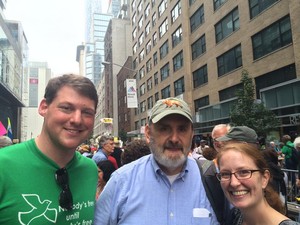As Gary wrote earlier, we are preparing as a small PCUSA delegation for the COP21 later this month (the 21st session of the Conference of the Parties to the UN Framework Convention on Climate Change). It begins November 30 and ends December 11 in Paris, France. While I won’t be there the whole time of the COP21, I am excited to observe and witness these international proceedings at this key moment in history. I look forward to sharing observations with you on this blog.
Not only is this a crucial time in the planet’s climate crisis, it is also a time where I see much hope: policy groundwork from the COP20 in Lima that’s been undergirding most of the 2015 deliberations, the papal encyclical on earth care this summer, a World Day of Prayer on the Care of Creation designated for September 1, the Pope’s visit in the fall with Presbyterians in attendance, the ongoing work of our 175 Presbyterian Earth Care Congregations, and the boards of all six Agencies of the PC(USA) adopting a position on environmental stewardship.
This is an important time. Full of opportunity and full of success stories and reasons for hope. It is also a time full of critical goals and measures that must be achieved. We know that fossil-fuel energy production, if continued in a “business as usual” sense, will create hard-to-imagine horrific realities for future generations, and that even our best efforts now to curbing greenhouse gas emissions will just begin to lessen the effects of poor decisions we’ve made in the last few decades. The time is now, to help our countries make strong voluntary commitments, and to be accountable for reaching them as the years progress. While there is much reason to hope, there also is no over-stating the crucial nature of this moment.
As people of faith, we are guided by hope, trusting that God is working in the world, loving and redeeming it with a grace we scarcely understand. At the same time, we as people of faith also know that there is a serious calling that God puts on our hearts, a demand for our involved and active discipleship, and a vocation laid out in Genesis 2:15 “to serve and preserve” this earth that God created. We hope and we act, together.
I was interviewed by a local station doing a segment on people traveling to Paris, and I sensed that the interviewer was waiting for me to talk about what a huge personal risk it would be, to travel after the recent attacks. My heart is full of grief for the pain in the world, for the broken relationships in it, and for horrific things—like recent attacks in Paris and Beirut—that rip our social fabric. We live in a scary time. Yet I cannot pretend it is a personal matter; the situation is scary for me in a larger, global sense.
Situations of climate injustice (drought, floods, conflicts over fossil fuels and other natural resources) go hand-in-hand with situations of violence. And human violence is something the earth itself mourns, as the biblical prophets tell us. Our relationship with God, our relationship with God’s creation, and our relationship with one another are all interconnected relationships that build up the beloved community, or that tear it apart. I want to see what we can do, as people of faith, to build it up. And, thus, I travel to Paris.
Traveling internationally seems to invite curiosity about danger and risk-taking. Yet we daily take much graver risks with our own future—and the safety of generations still to come—as we fill up our gas tanks, extract natural resources at alarming rates, and fail to subsidize renewable sources of energy and resource the way we do fossil fuels. These are risky endeavors, matters of life and death. We just happen to be used to them, somehow considering them to be necessary parts of daily life.
For me, the question really needs to be reframed. Not what awful risks we are taking if we travel internationally. Not even what awful risks come from living the way we do. It is important to be thoughtful, wise, and careful in both of these and other situations, yes. We need to know the realities in which we live. However, focusing on negative risk-taking seems to me to be a predictor of having the smallest possible solutions, to keeping ourselves—and the future—limited, boxed in, by our anxieties and fears. And, that is not who we were created to be, by a God who sent Christ in love, for love, for the whole cosmos.
Instead, what it we thought large, not contained by our anxieties? What if hope and love, faith and peace, became our reasons for asking questions? What if we ask instead: what positive risks are we willing to take, to be Christ’s disciples? What will we risk, for changing the current trajectory of climate impacts? What beautiful things might come, if we take the right risks? Will we risk giving up some personal comforts, certain understandings of wealth, an entitled sense of consumption? Will we risk living in confidence that simple is enough, that energy that is renewable and regenerative is top priority, that children’s health is more valuable than corporate profit?
Risk-taking can be synonymous with taking leaps of faith—and it is those leaps of faith, grounded in God’s love for the world, that I’m interested in exploring over these next few weeks with the COP21.

PC(USA) staff members Ryan Smith, Bill Somplatsky-Jarman and Rebecca Barnes at the People’s Climate March in NYC, Sept 2014